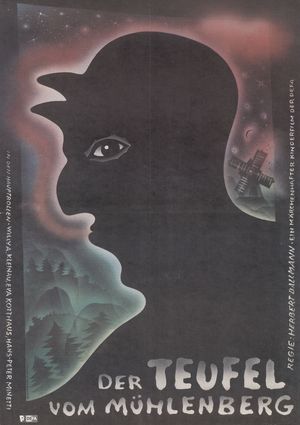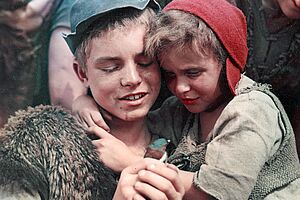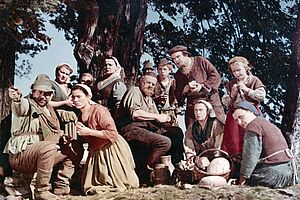Der Teufel vom Mühlenberg
Director: Herbert Ballmann, 85 Min., Color, Feature Film
Deutsche Demokratische Republik (DDR)
DEFA-Studio für Spielfilme, 1954
- Film/Video Format
- 35 mm
- Length in m
- 2366
- Other Title
- Der steinerne Mühlmann
- English Title
- Devil From Mill Mountain
- Premiere Date
- Release Date (for Cinema)

(Dir.: Herbert Ballmann, 1954) Graphic Design: Matthias Claus
Short Summary (English)
Once upon a time during the Middle Ages, the brutal, greedy owner of a windmill farm sets a forest mill on fire together with the castle steward and the village mayor according to a legend from the Harz Mountains. In a stormy night, they set to work disguised as devils, stealing even the last ration of flour from the mill. From this time on, the farmers are forced to have their grain ground at the evil miller's - particularly as he is spreading a rumor that there's a jinx on the forest mill. Anne, a farmhand, discovers the stolen sacks and so gets wind of the crime. The miller therefore has her abducted to the castle where her sweetheart, young miller Jörg is already being detained. But the three good charcoal burners, the spirits of the forest, rescue the pair; giving them the assignment of rebuilding the forest mill. Supported by the village farmers - and the forest spirits of course - the project succeeds. The next grain harvest is ground in the old mill once again. The grim miller is left empty-handed. When, in a towering rage, he tries to take revenge, the charcoal burners transform him into a stone statue.
Source: Progress Film-Verleih

(Dir.: Herbert Ballmann, 1954) Photography: Erich Kilian

(Dir.: Herbert Ballmann, 1954) Photography: Erich Kilian
Film Crew
- Director
- Script
-
- Kurt Bortfeldt
- Anneliese Probst
- Camera
-
- Götz Neumann
- Ernst Kunstmann (Trick)
- Film Editing
-
- Lieselotte Johl
- Cast
-
- Eva Kotthaus (Anne)
- Hans-Peter Minetti (Jörg)
- Willy A. Kleinau (Mühlmann)
- Werner Peters (Schulze Bangebös)
- Gerhard Frei (Burgvogt Raufer)
- Heinz Kammer (Ratte, der Kriegsknecht)
- Johannes Arpe (Schmied Anselm)
- Marianne Rudolph (Marthe, Frau von Schmied Anselm)
- Jupp Stauder (Knecht Konrad)
- Gertrud Paulun (Magd Marie)
- Hans Klering (Waldmüller)
- Lotte Loebinger (Waldmüllerin)
- Werner Tronjeck (Bauer Melchior)
- Kurt Ulrich (Bauer Martin)
- Georg Neimann (Bauer Thomas)
- Trude Brentina (Else)
- Brigitte Lindenberg (Margit)
- Alfred Maack (Der Graue Köhler)
- Aribert Grimmer (Der Schwarze Köhler)
- Wolf Beneckendorff (Ausrufer)
- Johannes Maus (Bauer Schütt)
- Kurt Sperling (Bauer Großkopf)
- Günther Rettschlag (Peter, Sohn des Schmieds Anselm)
- Uwe Müller (Georg)
- Helmut Fiedler (Hagerer Reisiger)
- Willi Endtresser (Reisiger Kuno)
- Renate Schwetasch (Kathrin)
- Willi Semmelrogge (Roter Köhler)
- Hedwig Appel (Großmutter)
- Assistant Director
-
- Ruth Sanden
- Gerhard Jentsch
- Assistant Camera
-
- Peter Süring
- Production Design
-
- Karl Schneider
- Script Editing
-
- Walter Schmitt
- Music
-
- Joachim Werzlau
- Sound
-
- Karl Tramburg
- Costume Design
-
- Walter Schulze-Mittendorff
- Make-Up
-
- Herbert Zensch
- Gerhard Petri
- Production Management
-
- Hans-Joachim Schoeppe
- Unit Production Management
-
- Fritz Delp
- Lothar Klunter
- DEFA Photography
-
- Erich Kilian
Short Summary (German)
Nach einer Sage aus dem Harz steckte irgendwann im Mittelalter ein brutaler gieriger Mühlmann zusammen mit dem Burgvogt und dem Dorfschulzen eine Waldmühle in Brand, zu der die Bauern ihr Korn brachten. Fortan sollen sie nur noch in seiner Mühle mahlen, und er diktiert die Bedingungen. Anne, die auf dem Mühlhof arbeitet, kommt dem Verbrechen auf die Spur, und gemeinsam mit dem mutigen Jörg fasst sie den Plan, heimlich die abgebrannte Mühle wieder aufzubauen. Unterstützt von den Köhlern, den guten Geistern des Waldes, und den Bauern des Dorfes gelingt das Vorhaben. Die nächste Ernte wird wieder in der alten Mühle gemahlen, und der finstere Müller geht leer aus. Als er in rasender Wut Rache üben will, greifen die Köhler ein und verwandeln ihn in ein steinernes Standbild.
(Quelle: Das zweite Leben der Filmstadt Babelsberg. DEFA-Spielfilme 1946-1992)
Short Summary (Other Languages)
Narra una leggenda dell'Harz, che nel Medioevo un avido mugnaio, un castellano e un sindaco incendiarono il mulino nel bosco, dove i contadini macinavano il loro grano. Da quel momento in poi, la gente avrebbe macinato solo dal mugnaio, sottostando alle sue condizioni. Ma Anna, che lavorava sul podere del mugnaio, scoperto il crimine, decise di ricostruire con il coraggioso Jörg, il vecchio mulino. Aiutati dagli spiriti buoni della foresta e dai contadini, i ragazzi riuscirono nell'impresa. Quando, con il successivo raccolto, l'avido mugnaio restò a bocca asciutta e tentò di vendicarsi, fu trasformato in una statua di pietra. (Italienisch)



